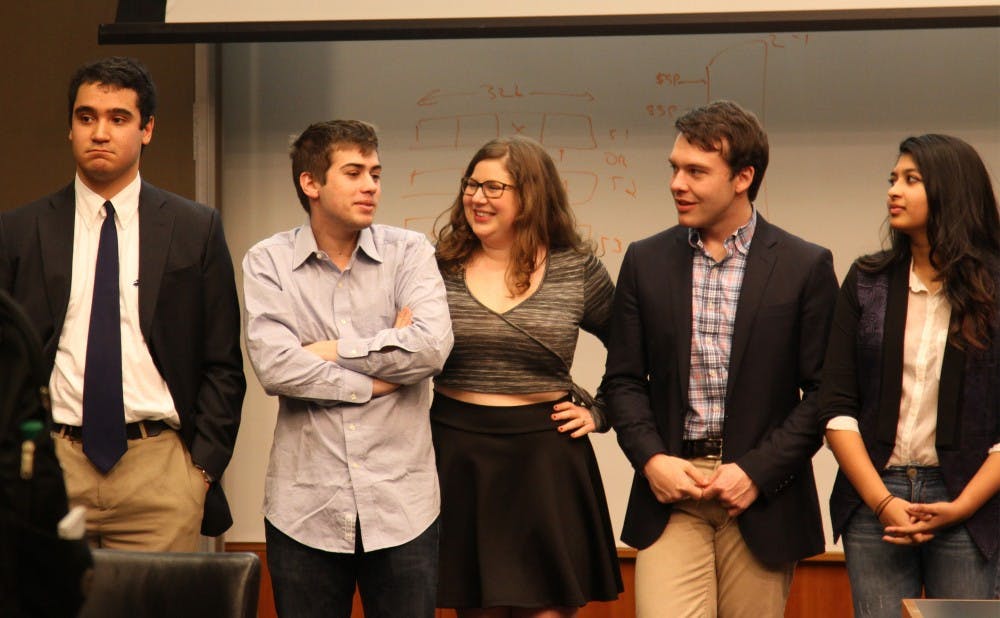Although Duke Student Government has faced issues with its perception on campus, diversity and voter turnout, student government leaders at other universities said those problems are not unique.
During the recent DSG presidential elections, one of the main topics of discussion for candidates was the negative opinion many students have of the organization. Candidates emphasized enacting reforms to make the organization more responsive to students.
“Throughout my campaign, I [expressed that] I know that the dominant narrative is that ‘DSG doesn’t do anything’, but I don’t believe that to be true,” said DSG president-elect Tara Bansal, a junior. “I knew that because I have seen cool work happen through DSG.”
At other institutions, students’ perception of the governing bodies at their universities varies.
Students from Yale, the University of Texas at Austin and the University of North Carolina at Chapel Hill said they believe that their student government has substantial influence.
“[Student government] has an impact on school policy issues,” wrote UNC freshman Rohun Shah, executive assistant to student body president Bradley Opere, in an email. “We have the support of many student organizations, as well as a say with the Board of Governors.”
At UT-Austin, freshman Makenzie Stuard, a college of liberal arts representative, wrote in an email that many members of the student body there view the student government negatively. By contrast, Sam Bensinger, chief of staff of the Yale College Council, said that students at Yale are generally aware of what the student government does and are responsive to YCC communication.
Joe English, president of YCC, wrote in an email that YCC has been able to impact issues such as financial aid, sexual misconduct policy, counseling resources, diversity and resources for the LGBTQ community.
Another challenge faced by student governments is ensuring diversity of their representatives.
DSG conducted a demographics survey in February and found that the Senate is comprised of more white and male students as well as students with a higher average socioeconomic status than is representative of Duke’s student body.
Bensinger and Shah noted that diversity is also a problem for student representatives at Yale and UNC. Bensinger explained that the YCC is trying to make elections more accessible to a wide variety of students.
“We definitely struggle with [diversity],” he said. “We try to work with the cultural houses as much as we can.”
Stuard noted that although many UT-Austin students have a negative impression of student government, diversity is not a main reason why, adding that the student body elects a wide range of candidates.
DSG has also aimed to combat low voter turnout in recent years, but DSG and student governments at UT-Austin, Yale and UNC have relatively high turnouts.
W.H. “Butch” Oxendine—the executive director of the American Student Government Association, a national organization for collegiate student governments—wrote in an email that voter turnout among private institutions is about 15 to 20 percent and 2 to 4 percent when other colleges are included.
DSG had a higher voter turnout this year than UT-Austin’s student government, YCC and the national student government average with a turnout of 36 percent in February’s presidential and executive vice president elections. UNC’s turnout was slightly higher than turnout for DSG elections.
According to the Daily Texan, for UT-Austin’s executive alliance race, which elects the president and vice president, 9,942 students voted this year—approximately 25 percent of the student body.
“Most people I talk to refuse to vote in the student government elections because they believe it is a popularity contest with a baseless aim, and to be fair, a lot of the times it is,” Stuard wrote.
YCC officer elections turnout was approximately 30 percent, according to data from the Yale Daily News. UNC had almost 38 percent of its undergraduate population vote in a similar election, according to statistics from The Daily Tar Heel.
Get The Chronicle straight to your inbox
Signup for our weekly newsletter. Cancel at any time.
Class of 2019
Editor-in-chief 2017-18,
Local and national news department head 2016-17
Born in Hyderabad, India, Likhitha Butchireddygari moved to Baltimore at a young age. She is pursuing a Program II major entitled "Digital Democracy and Data" about the future of the American democracy.

